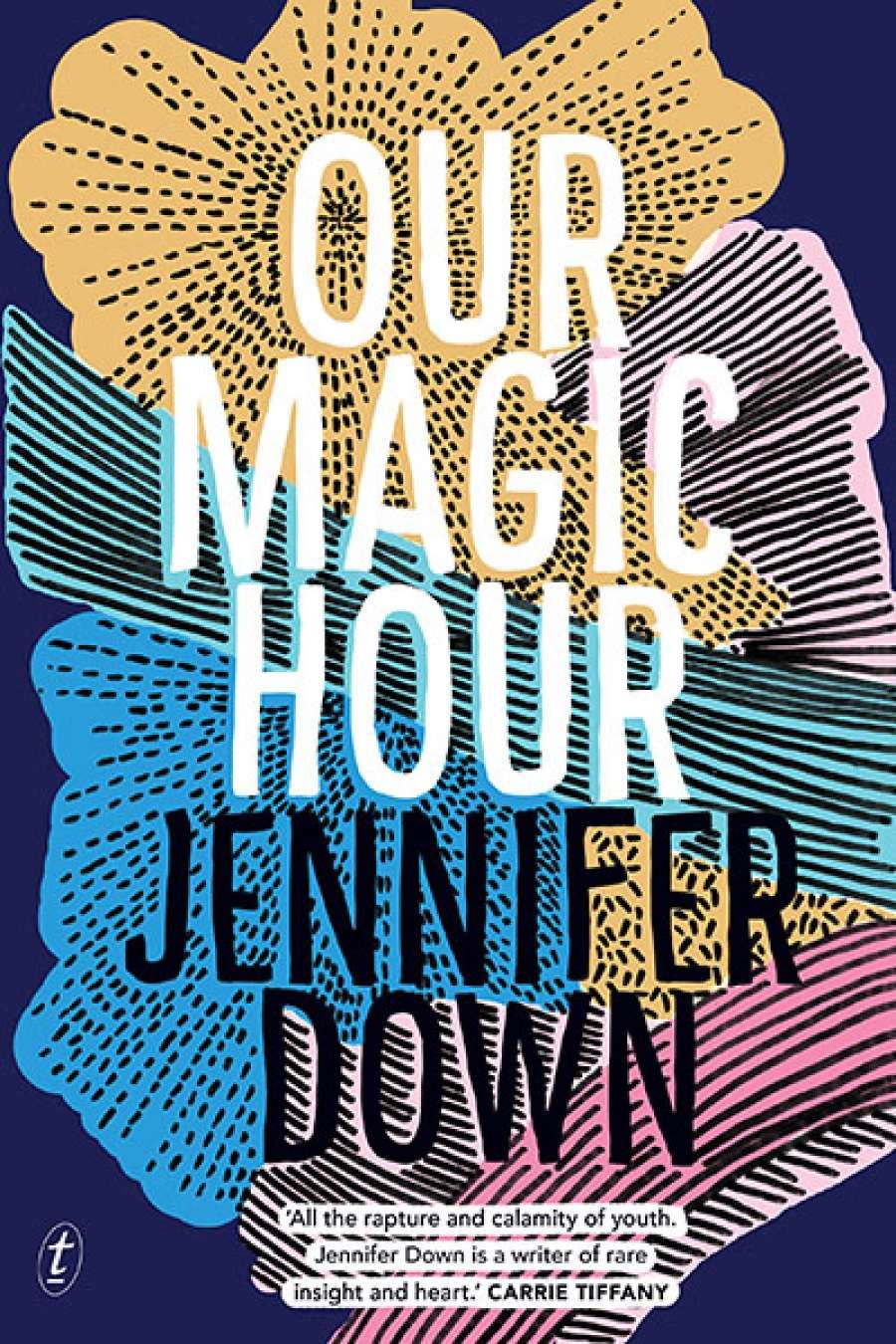
- Free Article: No
- Contents Category: Fiction
- Custom Article Title: Gretchen Shirm reviews 'Our Magic Hour' by Jennifer Down
- Book 1 Title: Our Magic Hour
- Book 1 Biblio: Text Publishing, $29.99 pb, 288 pp, 9781925240832
 Jennifer DownDown is a young Melbourne writer whose manuscript won the Victorian Premier's Literary Award for an Unpublished Manuscript. She received the 2014 ABR Elizabeth Jolley Short Story Prize for her short story 'Aokigahara'. Now she has written an impressive and emotionally sophisticated novel.
Jennifer DownDown is a young Melbourne writer whose manuscript won the Victorian Premier's Literary Award for an Unpublished Manuscript. She received the 2014 ABR Elizabeth Jolley Short Story Prize for her short story 'Aokigahara'. Now she has written an impressive and emotionally sophisticated novel.
Audrey works as a child protection caseworker, a job she finds rewarding but demanding. Even when she isn't at work, Audrey spends much of her time tending to the needs of others. Nick works as a paramedic: part of their attraction seems to arise from their mutual desire to help others. Still, Audrey can 'feel something leaking out of her pores, ready to poison everything else'. Katy's death raises deep questions about Audrey's own place in the world, and when something happens to a child she is responsible for she begins to question her suitability for her occupation.
Audrey's own background was difficult. She left home at seventeen, her father was abusive, and her French mother, Sylvie, is prone to fits of depression. As Audrey paints Sylvie's nails, she gives 'the occasional murmur to point out where the varnish was too light or had smudged on her cuticles'. Given the extent of her family's dysfunction, Audrey is surprisingly well adjusted, although other characters perceive her as 'hard'. Audrey herself is acutely aware of this: she 'caught sight of herself in the mirror: black stockings, black bra, the ribs of a mean dog'.
Down's narrative style is unadorned; what pleases here is the reader's immersion immersed in her characters' lives. We observe what they eat, who they sleep with, how they converse. Down opts for naturalism over a plot-driven narrative; there is no sense of her manipulating the players.
As for potential influences in Our Magic Hour, early Helen Garner comes to mind. There are overt nods in that direction – junkies on a tram, Audrey riding her bicycle through Melbourne's inner north, share houses, smatterings of French. The book is littered with sentences reminiscent of Garner's Monkey Grip. At a party, for example: 'The house groaned with the weight of so many feet. Bicycles littered the yard. The kids leaned against the fridge and slipped ice cubes down one another's shirts.' Also familiar is Down's ability to shock. Speaking of her father's abuse, Audrey recalls, 'He hit me so hard I needed plates to hold my eye socket together.' There are thematic cross-overs with Garner too. Questions of family and desire are at the heart of Our Magic Hour. Since her own family has proven unreliable, Audrey is struggling to reconfigure her life and to avoid reproducing the type of environment she was born into. Her occupation, in which she observes parents unable to satisfy their children's needs, reinforces these concerns. When Nick and Audrey's relationship breaks down, Audrey becomes involved with a man whose moods are like 'roads with hairpin turns'.
Class considerations in the novel are similar to those in Garner's fiction: the character's occupations and the suburbs of Melbourne in which the novel is set: Fitzroy, Northcote, and Thornbury. Bruce Springsteen even rates a mention. Yet Down locates her scenes in the present, with cultural references that might be unfamiliar to Garner's generation.
What throws Audrey into crisis is that, in comparison to her own upbringing, Katy's was so orderly: 'Her parents umpired at weekend netball matches, took orange quarters for the girls in their pleated skirts. Audrey's parents destroyed each other.' But while Katy was plagued by insecurity and self-doubt, Audrey is a survivor.
Towards the end of the book, Nick says to Audrey, 'When it ended up so bad, it's hard to imagine things being good again.' Though Nick is talking here about their relationship, the line is also applicable to Audrey's broader dilemma. So much about Audrey's world is fractured that it is difficult for her to imagine a positive alternative.
While Down doesn't diminish her carefully crafted narrative by ending with an abrupt epiphany, it is significant that the book's title is a reference to a rainbow coloured sign that looms over one of Melbourne's factories. From this industrial gloom, something beautiful unexpectedly rises. It is a message of hope that arcs poetically over this powerful new novel.


Comments powered by CComment